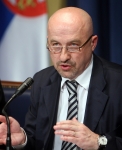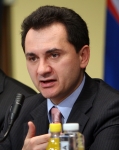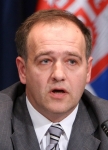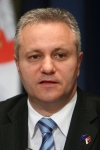Q:
A:
Government decides to hold elections in Kosovo
Belgrade,
17 April 2008
Serbian Minister of Trade and Services Predrag Bubalo said today that the government has passed a decision to hold parliamentary and local elections in Kosovo on May 11 regardless of UNMIK's position on this issue.
In a press conference, Bubalo said that correspondence between the Serbian government and the UN civil administration in Kosovo is ongoing, but that the decision to hold the elections has been made.
According to him, the decision was passed unanimously and there was no dilemma on this issue among government members.
The Minister said that the government decided to provide payments for public servants in interim Kosovo institutions, including those on strike.
He also said that a working team for paying out a daily expense allowance for time spent at war in Kosovo will be formed to solve the requests of military reservists.
The team will comprise representatives of five ministries and four reservists’ representatives he said and noted that they will hold the first meeting tomorrow.
He confirmed the arrival of an official Russian delegation to discuss the energy deal with the Serbian government.
Bubalo announced he will meet with Russian Minister for Emergency Situations and Disaster Relief Sergei Shoigu to discuss further work of the Serbian, Russian interstate committee.
They will also discuss other topics, including the gas arrangement related to the construction of the South Stream gas line through Serbia, Bubalo said and added that the Russian delegation will meet with Serbian President Boris Tadic and Prime Minister Vojislav Kostunica.
According to him, the decision was passed unanimously and there was no dilemma on this issue among government members.
The Minister said that the government decided to provide payments for public servants in interim Kosovo institutions, including those on strike.
He also said that a working team for paying out a daily expense allowance for time spent at war in Kosovo will be formed to solve the requests of military reservists.
The team will comprise representatives of five ministries and four reservists’ representatives he said and noted that they will hold the first meeting tomorrow.
He confirmed the arrival of an official Russian delegation to discuss the energy deal with the Serbian government.
Bubalo announced he will meet with Russian Minister for Emergency Situations and Disaster Relief Sergei Shoigu to discuss further work of the Serbian, Russian interstate committee.
They will also discuss other topics, including the gas arrangement related to the construction of the South Stream gas line through Serbia, Bubalo said and added that the Russian delegation will meet with Serbian President Boris Tadic and Prime Minister Vojislav Kostunica.
Serbian Deputy Prime Minister Bozidar Djelic said that the government adopted a draft of the agreement with UNMIK that is to specify relations in cooperation with UNMIK in crucial sectors such as the police, health, judiciary and customs.
Djelic said that this agreement is similar to the one signed by former deputy prime minister Nebojsa Covic and former UNMIK chief Hans Haekkerup.
He said that the government insists on respect for UN Security Council Resolution 1244 in UNMIK's work and will not accept that some of its officials refer to the rejected Ahtisaari plan.
A strategic document specifying Serbia’s needs for international help from 2008 to 2010 was adopted in today’s session, Djelic said.
He stated that the government decided to grant one-off assistance to budget users in the amounts of RSD 3,000 and RSD 5,000.
Those working in public administration, the health sector, education, culture, science, the army, police and the Security and Intelligence Agency can expect a raise and one-off assistance in April, he announced.
Djelic explained those working in education will get a 5% salary raise plus once-off assistance of RSD 3,000.
According to Djelic, budget users whose basic salaries will be increased by a smaller amount will receive a lump sum of RSD 5000.
He stressed that pay rise and one-off assistance to public employees will not affect the budget balance, since this expenditure was calculated in advance and will not cause inflation to rise.
Djelic said that this agreement is similar to the one signed by former deputy prime minister Nebojsa Covic and former UNMIK chief Hans Haekkerup.
He said that the government insists on respect for UN Security Council Resolution 1244 in UNMIK's work and will not accept that some of its officials refer to the rejected Ahtisaari plan.
A strategic document specifying Serbia’s needs for international help from 2008 to 2010 was adopted in today’s session, Djelic said.
He stated that the government decided to grant one-off assistance to budget users in the amounts of RSD 3,000 and RSD 5,000.
Those working in public administration, the health sector, education, culture, science, the army, police and the Security and Intelligence Agency can expect a raise and one-off assistance in April, he announced.
Djelic explained those working in education will get a 5% salary raise plus once-off assistance of RSD 3,000.
According to Djelic, budget users whose basic salaries will be increased by a smaller amount will receive a lump sum of RSD 5000.
He stressed that pay rise and one-off assistance to public employees will not affect the budget balance, since this expenditure was calculated in advance and will not cause inflation to rise.
The decision was made in order to help citizens deal with the growing prices of food, energy, utilities and similar steps are taken by governments in other countries as well.
According to Djelic, the total amount set aside from the budget for salary increases and one-off payments will be nearly RSD 2 million.
Education Minister Zoran Loncar said that 125,000 employees in the education sector will get a raise, as well as one-time lump sum payments to the amount of RSD 5000, for those who have lower salaries.
He added that a sum of RSD 370 million will be set aside from the budget and more than RSD 466 million for one-time assistance payments.
According to Djelic, the total amount set aside from the budget for salary increases and one-off payments will be nearly RSD 2 million.
Education Minister Zoran Loncar said that 125,000 employees in the education sector will get a raise, as well as one-time lump sum payments to the amount of RSD 5000, for those who have lower salaries.
He added that a sum of RSD 370 million will be set aside from the budget and more than RSD 466 million for one-time assistance payments.
Serbian Minister of Economy and Regional Development Mladjan Dinkic said that a 7.5% growth rate during the last year made it possible to increase the salaries of budget users.
He stressed that in the future whenever the growth rate is more than 5% all those who receive salaries from the budget should also be paid lump sums at Christmas and Easter Holidays.
Dinkic recommended that lump sums should be paid to employees in public and private companies this month for Easter Holidays, according to funds available.
He said that the government decided today to resolve the problems of Magnohrom employees according to the ministry’s proposal.
Dinkic recalled that Magnohrom receives RSD 20 million monthly in subsidies which means that employees are being paid and added that it was decided that employees will be paid based on years of service which will include the period of time when they were not paid health benefits and contributions for the pension funds, for which a sum of RSD 55 million will be put aside from the Pension and Disability Insurance.
He said that one measure for resolving problems in Magnohrom is the social programme with incentive measures for those who voluntarily wish to leave their jobs, which means that employees who report by April 30 will be paid €200 per year of service, and payments will be made by May 10.
The Minister explained that all measures adopted are in accordance with the law and added that the same principle will be applied to the problem of paying those employees who are insisting on being compensated for unpaid salaries.
According to Dinkic, the employee is responsible for unpaid salaries and not the state and this is why depending on the success of the privatisation process their demands will be met.
Dinkic said that the Ministry of Economy will examine possibilities to sell a part of the property of Magnohrom and try to meet employee demands.
He stressed that in the future whenever the growth rate is more than 5% all those who receive salaries from the budget should also be paid lump sums at Christmas and Easter Holidays.
Dinkic recommended that lump sums should be paid to employees in public and private companies this month for Easter Holidays, according to funds available.
He said that the government decided today to resolve the problems of Magnohrom employees according to the ministry’s proposal.
Dinkic recalled that Magnohrom receives RSD 20 million monthly in subsidies which means that employees are being paid and added that it was decided that employees will be paid based on years of service which will include the period of time when they were not paid health benefits and contributions for the pension funds, for which a sum of RSD 55 million will be put aside from the Pension and Disability Insurance.
He said that one measure for resolving problems in Magnohrom is the social programme with incentive measures for those who voluntarily wish to leave their jobs, which means that employees who report by April 30 will be paid €200 per year of service, and payments will be made by May 10.
The Minister explained that all measures adopted are in accordance with the law and added that the same principle will be applied to the problem of paying those employees who are insisting on being compensated for unpaid salaries.
According to Dinkic, the employee is responsible for unpaid salaries and not the state and this is why depending on the success of the privatisation process their demands will be met.
Dinkic said that the Ministry of Economy will examine possibilities to sell a part of the property of Magnohrom and try to meet employee demands.














